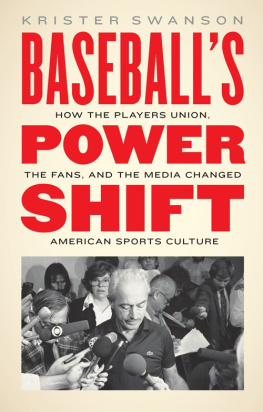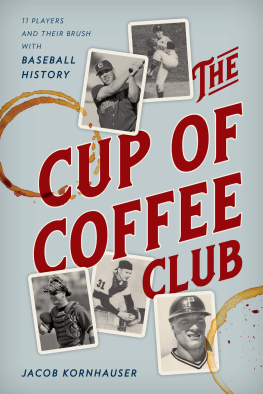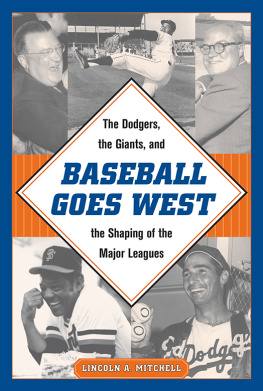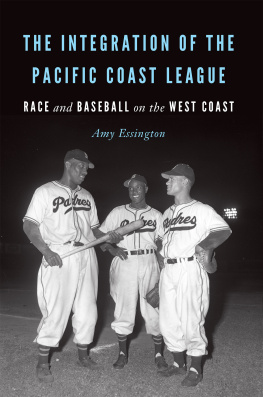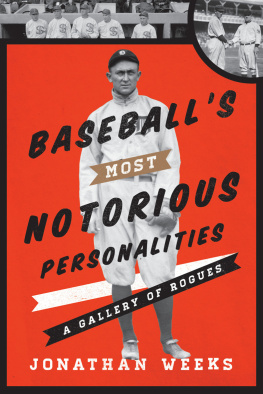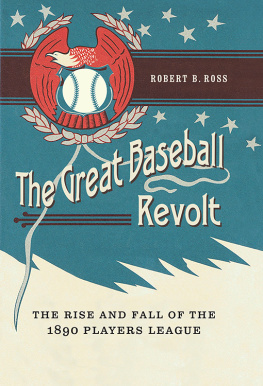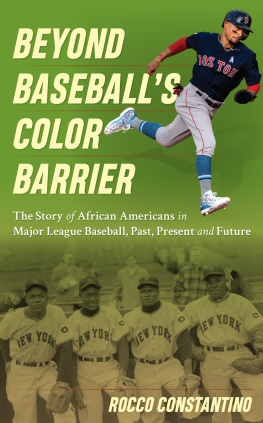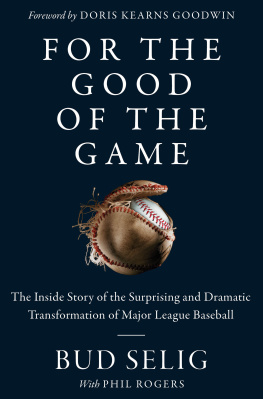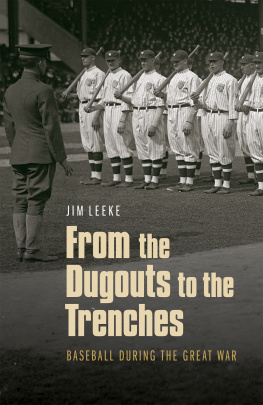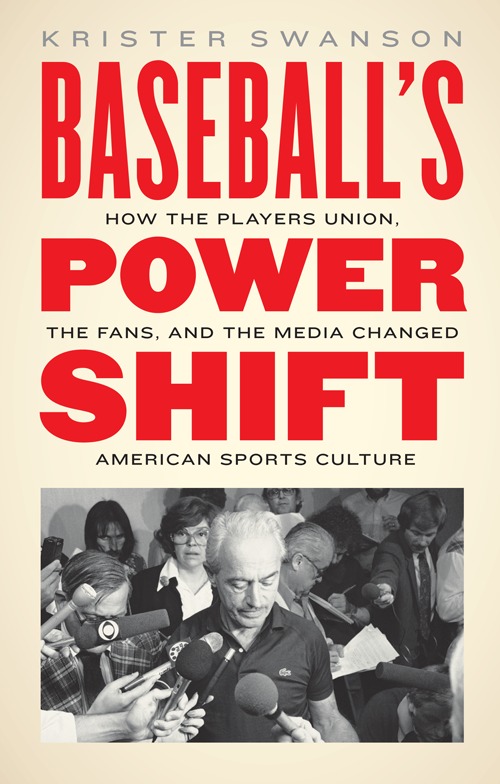Its a bizarre comment on our times that one of the strongest unions in the United States counts millionaires as members and exists in the world of sports. But thats the story of the Major League Baseball Players Union. Im often asked how this came to be and if there are actually lessons for the broader labor movement in the success seen by baseball players. For those who have wondered about this history or want to glean these lessons, this is the book weve been waiting for. Swanson is a great storyteller, weaving a narrative both timeless and timely.
If you want to know how major league ballplayers went from making ends meet with winter jobs to signing multimillion dollar contracts, read Baseballs Power Shift.... This is a fine study of sport, business, and labor.
Baseballs Power Shift
How the Players Union, the Fans, and the Media Changed American Sports Culture
Krister Swanson
University of Nebraska Press | Lincoln & London
2016 by Krister Swanson
Cover image AP Images / Ed Kolenovsky
Author photo courtesy of Cornerstone Photography
All rights reserved
Library of Congress Cataloging-in-Publication Data
Names: Swanson, Krister, author.
Title: Baseballs power shift: how the players union, the fans, and the media changed American sports culture / Krister Swanson.
Description: Lincoln: University of Nebraska Press, 2016.Includes bibliographical references and index.
Identifiers: LCCN 2015034504
ISBN 9780803255234 (hardback: alk. paper)
ISBN 9780803288041 (epub)
ISBN 9780803288058 (mobi)
ISBN 9780803288065 (pdf)
Subjects: LCSH : Baseball playersLabor unionsUnited StatesHistory. | Major League Baseball Players AssociationHistory. | Collective bargainingBaseballUnited States. | BaseballEconomic aspectsUnited States. | BaseballUnited StatesHistory. | BaseballSocial aspectsUnited States. | Mass media and sportsUnited States. | BISAC : SPORTS & RECREATION / Baseball / History. | SPORTS & RECREATION / Business Aspects. | BUSINESS & ECONOMICS / Labor.
Classification: LCC GV 880.2 . S 83 2016 | DDC 796.357/640973dc23 LC record available at http://lccn.loc.gov/2015034504
The publisher does not have any control over and does not assume any responsibility for author or third-party websites or their content.
Contents
It is simple, a total clich, and absolutely true: this book was only possible because of the love and support of my family. My wife, Stacy, and sons, Dane, Erik, and Nate, made it possible for a full-time teacher and parent to be a full-time grad student as well. It is impossible to overstate how much they have meant to me throughout this process.
My mother, Jan Bowman, blazed the trail up to UC Santa Barbara, and my father, Gerry Swanson, helped her do it. Nobody was more excited about the publication of this book than my dad. My grandfather, Leroy Swanson, was the ultimate traditionalist fan. He took me to my first Major League game and nurtured my love for baseball throughout my childhood. Thanks also to my grandmother, Lois Swanson, who had all the best traits of both Marvin Miller and Branch Rickey.
I have tremendous gratitude as well for the support and help from my friends, colleagues, and the staff at the University of Nebraska Press. First and foremost in this group are Nelson Lichtenstein and Laura Kalman, who provided continued support, advice, and guidance throughout the course of this project. Many good friends in the teaching profession also played significant roles. Mark Kilmer and Brian Friefeld sounded out a wide variety of ideas, good and otherwise. My team-teaching partner, Tasha Beaudoin, was always a valuable sounding board, and Ron Kragthorpe, Heather Feigenbaum and Debbie Leibold provided a great deal of help in editing early versions of this project. Finally, I am deeply grateful for all of the invaluable help and support I received from the good people of the University of Nebraska Press, who embraced the spirit and purpose of this book and shepherded me through the publication process.
While professional baseball remains very popular in the United States today, it is easy to forget that the game held an even more prominent place in our nations everyday life from the late 1800s through the 1980s. It was truly our national pastime, and Americans from every ethnic background and walk of life shared a passion for the game. With its deep Yankee origins and traditions, the game introduced millions of new citizens to what it meant to be a true American. Baseball helped reinforce a shared sense of community in rapidly growing cities bursting at the seams with immigrants from all over Europe. It rode the wave of new media forms to even greater popularity, with radio stations like KMOX in St. Louis turning an entire region of the nation into Cardinals fans and publications like the Sporting News prospering almost exclusively on the public demand for the latest information about the game and the heroic men who played it.
Baseballs prominent place in American culture has led many historians to focus their work on the ways in which societal shifts brought about significant changes in the game. Over the course of the twentieth century, baseballs history was interwoven with major developments in race relations, life on the home front during World War II, and postwar expansion into the Sunbelt. These are all worthy topics, and many exceptional books explore them to the fullest. I share these historians intellectual interest in the relationship between baseball and society, but instead of focusing on one particular historical moment or theme, I chose to look at a give-and-take relationship between the game and our society. I wanted to write not just about the ways in which society brought about change in the game but also the ways in which baseball, and specifically its players union, reshaped American society and culture. The growth of the union movement provides an ideal opportunity for this type of study. The players unionization efforts required public support in order for them to succeed. This forced the players, and their union leaders, to heed the shifting demands of public opinion in order to maintain this support. Over time the players union members not only responded to public opinion, they actively worked to shape opinion in order to win the backing of the baseball public. As a result, the players attempts to unionize had a major impact on the values and ideals of American sports fans, and ultimately on the entirety of American sports culture.
This story goes back nearly to the birth of the game. Baseballs beginnings date to the 1850s, and in short order it became a popular pastime among soldiers during the Civil War. Within a decade of the wars completion, there were professional baseball leagues throughout the northeastern United States. The highest level of competition, known as Major League Baseball, was well established by the early 1880s. These early ballplayers enjoyed the same basic relationship with the capital class as workers of every stripe did during the Gilded Age. Team owners sought to exercise the same control over their players as factory owners enjoyed over their workers. The owners, often referred to as magnates, structured the standard player contract to limit the players freedom of contract, bargaining power, and control over working conditions. Ballplayers, just like workers in other industries, sought to unionize in order to improve their conditions and found themselves dealing with the same frustrations as other nascent unions of the time.

